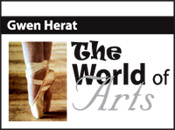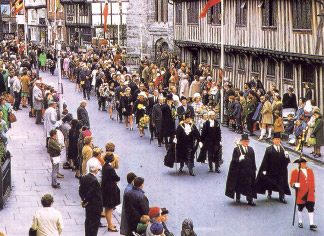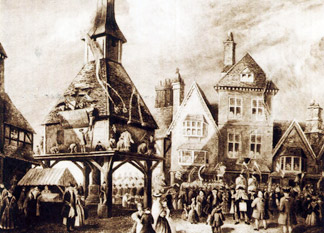|
Inside Shakespeare's mind:
What followed the Garrick jubilee
 At the beginning no one ever imagined the colossal impact that the
Garrick Jubilee of 1769 organised by David Garrick, a famous actor,
would have on the popularity on William Shakespeare's works. At the beginning no one ever imagined the colossal impact that the
Garrick Jubilee of 1769 organised by David Garrick, a famous actor,
would have on the popularity on William Shakespeare's works.
Had Garrick lived the day, he himself would have been amazed at the
impetus he was responsible for. The growing national interest in
Shakespeare's life and work during the first half of the eighteenth
century reflected itself in the publication of Nicholas Rowe's life and
works of Shakespeare and the numerous subsequent editions of the plays
in the growing popularity of the productions of plays and in the
increasing number of literary pilgrims visiting Stratford.
The first recorded Shakespeare production in the town were by the
company of strolling players led by John Ward in 1746. Visitors wishing
to see Shakespeare's mulberry tree at New Place planted by the poet
himself, had become so numerous and caused annoyance to the owner of the
property who decided to cut it down in 1756. It was in the middle of
this century that this incident took place. Three years later when the
owner of the property decided to demolish the house, local indignation
rose to such heights that he was compelled to abandon the property and
get lost. It was amid curses and rage of its inhabitants.
 |
|
Shakespeare pageant outside
Shakespeare's Birthplace at Stratford |
And thirteen years later in 1769, the widely publicized Shakespearian
Festival organised by David Garrick, gave the impetus to Stratford's
rising popularity as a shrine of literary pilgrimage when a magnificent
octagonal amphitheater was erected on the Bancroft and the whole town
decorated in brilliant illuminations. The highlight of the programme was
Garrick's recitation of his Shakespearian Ode to Arni's music mariad the
highlight of the programme that included the firing of cannons public
breakfasts, concerts, masquarade and ball, serenades, processions,
fireworks, horse-racing on Shottery meadow and the likes of all other
than any performance of a Shakespeare play. It was such amemorable event
that what followed years on, wan no match to this event. Of course, as
usual in England, the weather spoilt the proceedings.
Visitors to the Birthplace and the Parish Church steadily increased
and Stratford gradually appreciated its good fortune with improvement of
communications which followed the celebrations of the Jubilee of 1769.
It is recalled that Walpole who visited the Birthplace in 1777,
described how he was shown Shakespeare's chair which had been pretty
much sliced and that he purchased a slice of the chair equal to the size
of a tobacco stopper. An amusing list of the spurious relics which he
saw exhibited in his house in 1815 was noted by Sir John Byng in his
diary. They include the shattered stock of the very matchlock with which
Shakespeare shot deer, This of course remain as a shameless exploitation
which did no good for Shakespeare nor Stratford. When Shakespeare's
house was offered for sale in 1847, public opinion was sufficiently
strong to ensure its purchase for preservation as a national memorial.
In London and Stratford volunteers raised Sterling pound 3,000 as
subscription to make this possible. Since that time, the property has
been administered by the Shakespeare Birthplace Trust.
The idea of holding annual celebrations was established in honour of
the poet was gradually established
and occasional productions of Shakespeare's plays were given in
buildings temporarily adapted for the purpose. It was a mega event when
the poet's bicenteray death in 1816 was celebrated by the Foundation of
the Shakespeare-Club which inspired Stratford's first permanent theater
in Chapel Lane in 1827 and organised a three-day Festival celebrations
in 1830.
Thirty four years later in 1864, the poet's tercentenary celebration
was followed by a big step forward with the establishment of the
festival idea in Stratford-Upon-Aveon. It began with the poet's birthday
and lasted for twelve whole days and judging from the contemporary
accounts the preparations which went into the planning were on a scale
almost comparable with the 1769 Jubilee.
 |
|
Annually, on the poet's birthday that
coincides with St. George's Day, a long procession winds its
way to pay floral homage and offer prayers at his tomb in
the Holy Trinity Church |
A massive and grand twelve-sided pavilion, constructed with timber on
foundations of masonary along with galleries, an orchestra, stage and
lit by gas, was erected in Southern Lane and this was a setting for a
full programme of concerts, fancy dress balls and the likes of it with
sumptious banquet dining in addition to the performance of Shakespeare's
plays. There were also additions of local excurtions to places of
Shakespearian interest were also added to the usual pageantry, merry
making and fireworks display. The Festival was considered the best
tribute of his time for the poet with orderly demonstrations.
Ten years later, in 1874 The Shakespeare Memorial Association was
inaugurated and from which the first Shakespeare Memorial Theater was
founded. It was mainly due to the enthusiasm and genorosity of its
founder, Charles Edward Flower who believed that the only natural and
proper place for a Shakespeare theater was in the poet's native town.
The Lodon critice were hostile in the face of local apathy but Flower
pressed on with his scheme and the Shakespeare Memorial Theater was open
on his birthday, 23, April in the year of 1879.
Hence was the start of the prestigeous Meccas of English literature,
The Royal Shakespeare Theater in Stratford. From then onwards Stratford
to the present, has had a Festival annually lasting only a few weeks.
But the Shakespeare season today, extends to over ten months linking
Stratford with an ever-increasing circle of Shakespeare lovers. The
present theater was opened in 1932 and still later, The Royal
Shakespeare stands proudly upon River Thames.
Each year on St. George's Day which also happens to be the poet's
birthday, 23 April, Strafford arranges celebrations and attended by the
nations of the world, at times with members of royalty.
The procession winds it way to the poet's tomb at the Holy Trinity
Church followed by a banquet for all present. |





